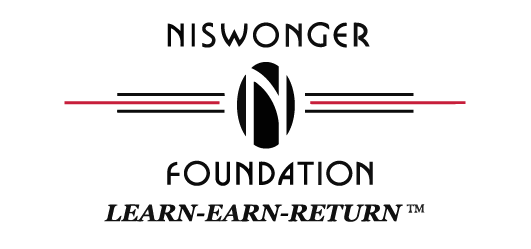Niswonger Foundation Announces $500,000 Literacy Grants To Hancock County Schools
At a media event held at Hancock County Elementary School, the Niswonger Foundation and Hancock County Schools announced the Niswonger Foundation’s receipt of two significant grants that will focus on kindergarten through second grade literacy development at Hancock County Elementary. The goal of this effort is increasing third-grade reading proficiency. A $450,000 grant from the Walmart Foundation and a $50,000 grant from the Annenberg Fund for Schools will provide a total of $500,000 in support of a three-year project that will be overseen by the Niswonger Foundation, in partnership with the Rural School and Community Trust.
The grant from the Annenberg Fund for Schools was used to create a “Book Room” of resources and technology for teaching literacy. The Walmart Foundation grant will fund a three-year initiative informed by best practices and the most effective program designs, particularly focused on the needs of rural schools. Fundamental to this effort is the belief that literacy is the single most important factor for ensuring that children have an opportunity for a successful future.
The need for this initiative is strongly supported in the 2016 Tennessee Department of Education report: “Setting the Foundation: A Report of Elementary Grades Reading in Tennessee.” This report stated that by measure of the Tennessee Comprehensive Assessment Program (TCAP), only 43 percent of Tennessee third graders and 45 percent of fourth graders perform on grade level in English language arts (ELA). In the same year, the National Assessment of Educational Progress (NAEP), known as the Nation’s Report Card stated that in 2015, only 33 percent of Tennessee students demonstrated proficiency in reading at the fourth grade level. This means that more than half of the students in Tennessee’s schools are not comprehending what they are reading by the end of fourth grade.
Statistics show that if a student is not proficient in reading at the end of the third grade, he or she is unlikely to make substantial progress towards that goal in the foreseeable future. In addition, Tennessee data indicate that many students earning proficient or advanced at the end of third grade will likely see a decline in the rating by fifth grade.
The reports indicated that only eight percent of students who are performing below grade level when they reach eighth grade will be able to meet the college-readiness benchmark on the ACT reading examination. For purposes of this initiative, literacy is being defined as a student having the ability to read, write, compute, and use technology at a level that enables him/her to reach their full potential.
The Niswonger Foundation and Hancock County Schools have agreed to support each other throughout this process by assisting the teacher, focusing on student learning, and sharing information to learn what works and what does not. Professional development, expert consultation, classroom technology, and instructional materials are being provided through the grants received by the Niswonger Foundation.
This three-year K-2 literacy initiative is designed to improve foundational skills necessary for reading mastery. The Niswonger Foundation is in the second year of a successful pilot project in Greene County. The best practices of that project will support the Hancock County efforts. The program staff and teachers are identifying the “best practices” in early literacy teaching methods. This initiative also provides teachers with the support they need to ensure engaging and effective instruction. Through a data driven, personalized, and highly supportive process, the end goal is to dramatically improve third grade literacy scores with a program that can be adaptable to other K-2 classrooms, particularly in rural settings. The major components of the program are:
- SCHEDULING: REALIGNING THE TEACHING SCHEDULE TO MEET INDIVIDUALIZED LEARNING NEEDS OF STUDENTS THROUGH THE USE OF EARLY LEARNING GROUPS (ELG’S)
- DATA: COLLECT, MONITOR AND REVIEW MULTIPLE SOURCES OF DATA TO INFORM TEACHERS REGARDING APPROPRIATE NEXT STEPS;
- TEACHER COLLABORATION: EXTENDED PLANNING TIME FOR INSTRUCTIONAL TEAM DISCUSSION OF DATA, STUDENT NEEDS, STRENGTHS/WEAKNESSES, AND REINFORCING THE RESPONSIBILITY FOR SHARED DECISION-MAKING AND RESPONSIBILITY;
- INSTRUCTIONAL ASSISTANTS: PROVIDE TRAINING AND SUPPORT TO BUILD ABILITIES AND CONFIDENCE TO SIGNIFICANT PARTNERS IN THE DELIVERY OF INSTRUCTION AND STUDENT PROGRESS;
- PARENT/COMMUNITY INVOLVEMENT: FOCUS ON THE IMPORTANCE OF COMMUNITY ENGAGEMENT. ESTABLISH ACTIVITIES FOR PARENTS/GUARDIANS, DESIGN VOLUNTEER OPPORTUNITIES FOR COMMUNITY PARTNERS; AND
- REPLICABILITY: DESIGN TO BE REPLICATED IN OTHER K-2 CLASSROOM SETTINGS WITH A PARTICULAR FOCUS ON THE NEEDS OF RURAL EDUCATION.
Addressing the media were Scott M. Niswonger, Chairman and Founder of the Niswonger Foundation; Rob Mahaffey, Executive Director, Rural School and Community Trust; Tony Seal, Director of Schools for Hancock County, Dr. Vicki Kirk, Tennessee Deputy Commissioner of Education; Sara Hurd, Niswonger/Hancock County Literacy Specialist; David Greene, Jr., Parent; Addilyn Mabe, Second Grade Student; Jackson Jones, First Grade Student; and Dr. Nancy Dishner, President and CEO, Niswonger Foundation.
Guests on-hand for the media event included Hancock County Commissioners and School Board Members, representatives from the offices of U.S. Senator Bob Corker and U.S. Congressman Phil Roe; Niswonger Foundation Board Members and Staff; community members; and family members.
At the close of the media event, the attendees toured the kindergarten, first and second grade classrooms; and the newly created Book Room.
